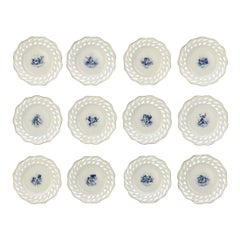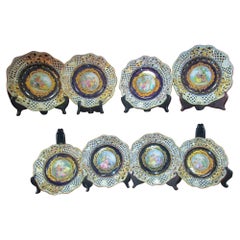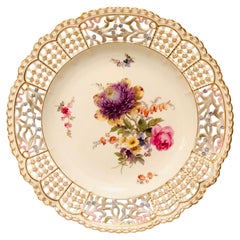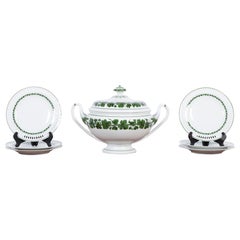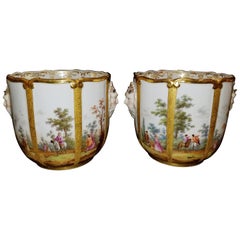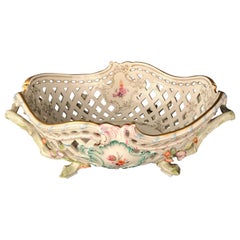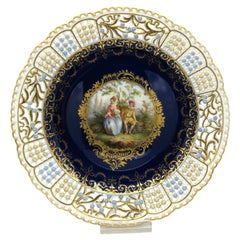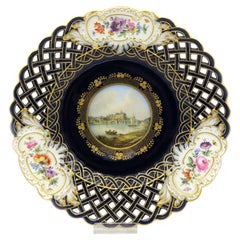19th Century Reticulated Meissen Plate
Antique 19th Century German Art Nouveau Dinner Plates
Porcelain
Antique 19th Century Romantic Porcelain
Porcelain
Antique 1890s German Romantic Porcelain
Porcelain
Antique Late 19th Century European Neoclassical Soup Tureens
Porcelain
People Also Browsed
Antique Mid-19th Century German Louis XVI Porcelain
Porcelain, Meissen
Antique Early 1900s German Art Nouveau Porcelain
Porcelain
Antique Early 19th Century French Empire Candelabras
Bronze
Antique Early 1900s Italian Art Nouveau Center Tables
Goatskin, Walnut
Antique 19th Century German Serving Pieces
Porcelain
19th Century Old Masters Portrait Paintings
Oil, Canvas
Antique 1720s Chinese Chinoiserie Antiquities
Ceramic
Antique 19th Century German Porcelain
Porcelain
Antique 1890s German Dinner Plates
Porcelain
Antique 1880s German Rococo Platters and Serveware
Porcelain
Antique 19th Century German Regency Revival Planters, Cachepots and Jard...
Ormolu, Bronze
Mid-20th Century German Mid-Century Modern Vases
Porcelain
Antique Late 19th Century German Rococo Revival Figurative Sculptures
Porcelain
Antique Mid-19th Century Austrian Baroque Porcelain
Porcelain
Antique Late 19th Century German Platters and Serveware
Porcelain
Antique Late 19th Century Austrian Porcelain
Porcelain
Recent Sales
Antique Late 19th Century German Porcelain
Porcelain
Antique Mid-19th Century German Porcelain
Porcelain
Antique 19th Century German Victorian Porcelain
Porcelain
Antique Late 19th Century German Other Porcelain
Porcelain
Antique Late 19th Century German Romantic Tableware
Porcelain
Antique Late 19th Century German Other Paintings
Porcelain
Antique 19th Century German Platters and Serveware
Porcelain
Antique 19th Century German Porcelain
Antique 19th Century German Rococo Porcelain
Porcelain
Antique 1890s German Romantic Porcelain
Porcelain
Antique 1890s German Romantic Porcelain
Porcelain
Antique Mid-19th Century German Porcelain
Porcelain
Antique Late 19th Century German Rococo Decorative Art
Porcelain
Antique 1890s German Romantic Porcelain
Porcelain
Antique 1890s German Romantic Porcelain
Porcelain
Antique 1880s German Romantic Porcelain
Porcelain
Antique Late 19th Century English Dinner Plates
Porcelain
Antique Late 19th Century German Porcelain
Porcelain
Antique 19th Century German Porcelain
Porcelain
19th Century Reticulated Meissen Plate For Sale on 1stDibs
How Much is a 19th Century Reticulated Meissen Plate?
Meissen Porcelain for sale on 1stDibs
Meissen Porcelain (Staatliche Porzellan-Manufaktur Meissen) is one of the preeminent porcelain factories in Europe and was the first to produce true porcelain outside of Asia. It was established in 1710 under the auspices of King Augustus II “the Strong” of Saxony-Poland (1670–1733), a keen collector of Asian ceramics, particularly Ming porcelain.
In pursuing his passion, which he termed his “maladie de porcelaine,” Augustus spent vast sums, amassing some 20,000 pieces of Japanese and Chinese ceramics. These, along with examples of early Meissen, comprise the Porzellansammlung, or porcelain collection, of the Zwinger Palace, in Dresden.
The king was determined, however, to free the European market from its dependence on Asian imports and to give European artisans the freedom to create their own porcelain designs. To this end, he charged the scientist Ehrenfried Walther von Tschirnhaus and aspiring alchemist Johann Friedrich Böttger with the task of using local materials to produce true, hard-paste porcelain (as opposed to the soft-paste variety European ceramists in the Netherlands, Germany, France, Italy and Spain had been producing since the late Renaissance). In 1709, the pair succeeded in doing just that, employing kaolin, or “china clay.” A year later, the Meissen factory was born.
In its first decades, Meissen mostly looked to Asian models, producing wares based on Japanese Kakiemon ceramics and pieces with Chinese-inflected decorations called chinoiserie. During the 1720s its painters drew inspiration from the works of Watteau, and the scenes of courtly life, fruits and flowers that adorned fashionable textiles and wallpaper. It was in this period that Meissen introduced its famous cobalt-blue crossed swords logo — derived from the arms of the Elector of Saxony as Arch-Marshal of the Holy Roman Empire — to distinguish its products from those of competing factories that were beginning to spring up around Europe.
By the 1730s, Meissen’s modelers and decorators had mastered the style of Asian ceramics, and Augustus encouraged them to develop a new, original aesthetic. The factory’s director, Count Heinrich von Brühl, used Johann Wilhelm Weinmann’s botanical drawings as the basis for a new line of wares with European-style surface decoration. The Blue Onion pattern (Zwiebelmuster), first produced in 1739, melded Asian and European influences, closely following patterns used in Chinese underglaze-blue porcelain, but replacing exotic flora and fruits with Western varieties (likely peaches and pomegranates, not onions) along with peonies and asters.
During the same period, head modeler Joachim Kändler (1706–75) began crafting delicate porcelain figures derived from the Italian commedia dell’arte. Often used as centerpieces on banquet tables and decorated to reflect the latest fashions in courtly dress for men and women, these figurines were popular in their day, and are still considered among Meissen’s most iconic creations. Kändler also created the Swan Service, which, with its complex low-relief surface design and minimal decoration is considered a masterpiece of Baroque ceramics.
The rise of Neoclassicism in the latter half of the 18th century forced Meissen to change artistic direction and begin producing monumental vases, clocks, chandeliers and candelabra. In the 20th century, Meissen added to its 18th-century repertoire decidedly modern designs, including ones in the Art Nouveau style. The 1920s saw the introduction of numerous animal figures, such as the popular sea otter (Fischotter), which graced an East German postage stamp in the 1960s. Starting in 1933, artistic freedom was limited at the factory under the Nazi regime, and after World War II, when the region became part of East Germany, it struggled to reconcile its elite past with the values of the Communist government. In 1969, however, new artistic director Karl Petermann reintroduced the early designs and fostered a new degree of artistic license. Meissen became one of the few companies to prosper in East Germany.
Owned by the State of Saxony since reunification, in 1990, Meissen continues to produce its classic designs together with new ones developed collaboratively with artists from all over the world. In addition, through its artCAMPUS program, the factory has invited distinguished ceramic artists, such as Chris Antemann and Arlene Shechet, to work in its studios in collaboration with its skilled modelers and painters. The resulting works of contemporary sculpture are inspired by Meissen’s rich and complex legacy.
Find a collection of authentic Meissen Porcelain on 1stDibs.
Finding the Right porcelain for You
Today you’re likely to bring out your antique and vintage porcelain in order to dress up your dining table for a special meal.
Porcelain, a durable and nonporous kind of pottery made from clay and stone, was first made in China and spread across the world owing to the trade routes to the Far East established by Dutch and Portuguese merchants. Given its origin, English speakers called porcelain “fine china,” an expression you still might hear today. "Fine" indeed — for over a thousand years, it has been a highly sought-after material.
Meissen Porcelain, one of the first factories to create real porcelain outside Asia, popularized figurine centerpieces during the 18th century in Germany, while works by Capodimonte, a porcelain factory in Italy, are synonymous with flowers and notoriously hard to come by. Modern porcelain houses such as Maison Fragile of Limoges, France — long a hub of private porcelain manufacturing — keep the city’s long tradition alive while collaborating with venturesome contemporary artists such as illustrator Jean-Michel Tixier.
Porcelain is not totally clumsy-guest-proof, but it is surprisingly durable and easy to clean. Its low permeability and hardness have rendered porcelain wares a staple in kitchens and dining rooms as well as a common material for bathroom sinks and dental veneers. While it is tempting to store your porcelain behind closed glass cabinet doors and reserve it only for display, your porcelain dinner plates and serving platters can safely weather the “dangers” of the dining room and be used during meals.
Add different textures and colors to your table with dinner plates and pitchers of ceramic and silver or a porcelain lidded tureen, a serving dish with side handles that is often used for soups. Although porcelain and ceramic are both made in a kiln, porcelain is made with more refined clay and is stronger than ceramic because it is denser.
On 1stDibs, browse an expansive collection of antique and vintage porcelain made in a variety of styles, including Regency, Scandinavian modern and other examples produced during the mid-century era, plus Rococo, which found its inspiration in nature and saw potters crafting animal figurines and integrating organic motifs such as floral patterns in their work.
